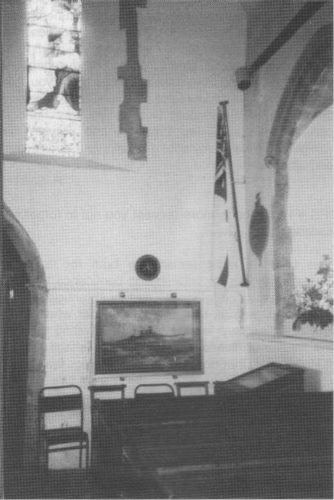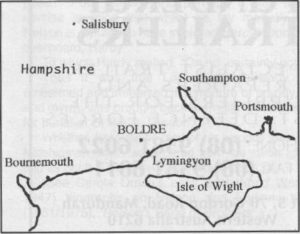- Author
- Date, John C., RANVR (Rtd)
- Subjects
- History - WW2
- Tags
-
- RAN Ships
- None noted.
- Publication
- September 1997 edition of the Naval Historical Review (all rights reserved)

Memorials to the loss of naval ships in UK are seldom seen but there is one of world-wide interest.
The old Parish Church of Boldre, the building of which commenced shortly after the Afforestation of the New Forest by William I in 1079 and continually added to since, makes it not only a structure of great charm but rather unique for a number of memorials.
The church contains the only memorial to HMS HOOD – the sinking of this great battlecruiser while in action against the German battleship BISMARCK and her escort the heavy cruiser PRINZ EUGEN on 24 May 1941. A beautiful painting of HOOD adorns the wall of the memorial side chapel and an illuminated book of remembrance contains the names of 1418 ship’s company, 1415 of whom lost their lives.
(The Church can be inspected by prior arrangement with Commander A. A. Pearce RN Rtd of nearby Lymington Tel.: 01590-942065).

Of particular interest to Australians is a plaque to Rev. Richard Johnson, Curator of Boldre and First Chaplain to the Colony of New South Wales.
The pew-runners all bear the arms of British Saints and the coloured backgrounds indicate the status – red for a martyr, royal blue for a king or queen, purple for a bishop, black for a monk and white for a nun.
The “Breeches Bible” or Geneva Bible as it is properly called, receives its more popular name from the translation of GENESIS 3.7, describing how Adam and Eve “made themselves breeches” instead of the “aprons” of the later Authorised Version. The Geneva Bible was first published in 1560 (copy at Boldre was printed in 1596).
Inscriptions on some of the older gravestones are also of interest. For example,
“I hope the change is for the best”
To live with Christ and to be at rest”.
“Hark from the tomb a doleful sound
My ears attend the cry,
Ye living men come view the ground
Where you must shortly lie”.
“Affliction sore long time I bore,
Physicians were in vain,
Till God was pleased to give me ease
And relieve me of my pain”.
